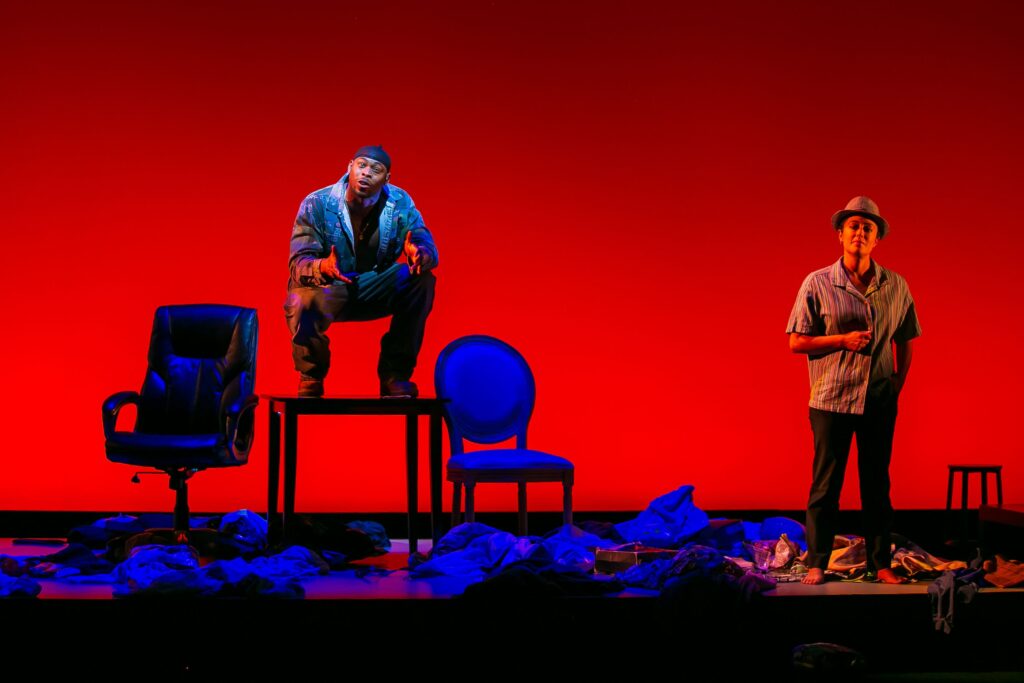
Twilight: Los Angeles, 1992 – Conceived, Written, and Revised by Anna Deavere Smith; Directed by Taibi Magar; Scenic Design by Riccardo Hernandez; Costume Design by Linda Cho; Lighting Design by Alan C. Edwards; Sound Design by Darron L West. Projection Design by David Bengali. Presented by American Repertory Theater in association with Signature Theatre at the Loeb Drama Center, 64 Brattle St., Cambridge through Sept. 24.
by Mike Hoban
In 1992, at the height of the riots following the “not guilty” verdict of the four white L.A. police officers who had been caught on videotape delivering a brutal beating to Black motorist Rodney King, I was having a conversation with a Black male coworker, to get some perspective on why the city was on fire. “Listen,” he told me in an even but pointed tone. “If you’re a Black man in this country, there’s almost zero chance that you haven’t been stopped by a cop at least once – for no reason – by the time you reach 21.” And as Congresswoman Maxine Waters (who is quoted in the play) directly put it, “(The) riot is the voice of the unheard.”
For much of white America, the King beating and the not guilty verdict by an all-white jury were both shocking and eye-opening. Except for some bad actors in the deep South, it was reasoned, this stuff wasn’t happening anymore, was it? But for the Black community, it came as no surprise. The verdict was just a continuation of the injustice that has been going on since the dawning of America. The toll from the rioting was devastating: 58 deaths; 2,383 injuries; more than 7,000 fire responses; 12,111 arrests; 3,100 businesses damaged.
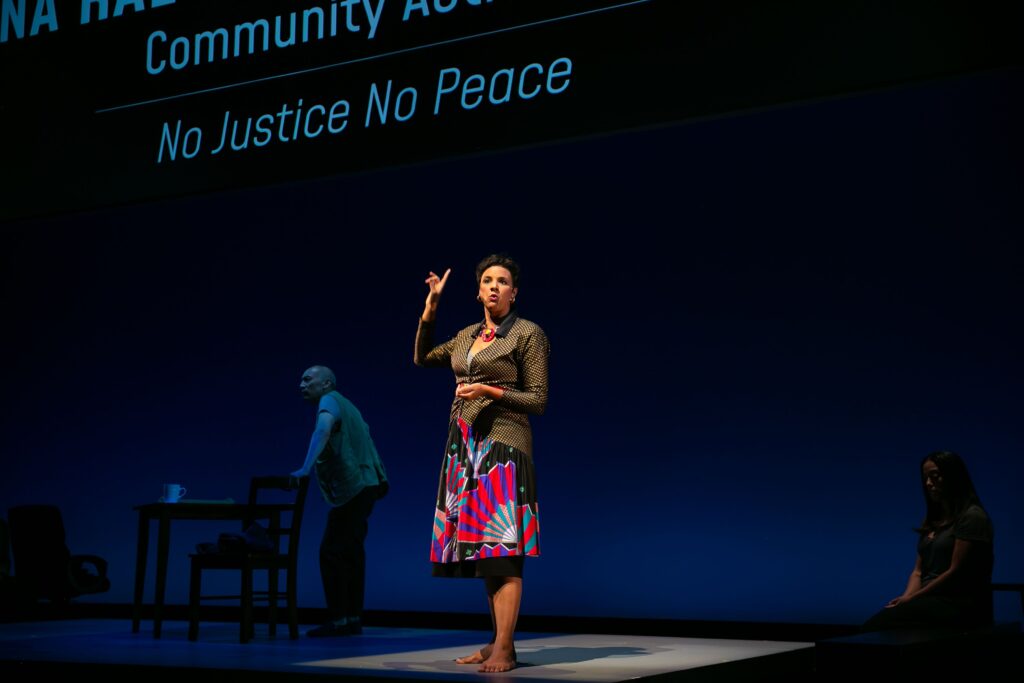
Anna Deavere Smith, who had begun previews of the similarly themed Fires in the Mirror (about the riots in the Crown Heights section of Brooklyn in 1991) during the height of the King riots, began a similar process for Twilight. She interviewed 320 subjects, including one of the acquitted officers, shopkeepers who had lost their businesses in the riots, police chief Daryl Gates and Congresswoman Maxine Waters, as well as eyewitnesses and community activists. She performed it as a solo show in 1993, was nominated for a Tony and won the Drama Desk Award for “Outstanding Solo Performance” in 1994. Nearly three decades later, she’s bringing the show to the A.R.T. – this time with a revised version written for a five person cast.
What makes Twilight so compelling is the storytelling, culled from verbatim interviews with the subjects. In the original incarnation, Smith played all of the characters, but in the revised version, the monologues are divided up among the five actors, and the clear delineation of the characters is a plus, I’m guessing, despite Smith’s incredible acting chops. The roles are mostly assigned by ethnicity rather than gender, with the exception of Francis Jue, who portrays both the male and female Korean characters, and Elena Hurst, who mostly recreates all of the Latinx subjects. The other roles are divided among Tiffany Rachelle Stewart, who performs most of the Black female characters; Wesley T. Jones, mostly Black male roles; and Carl Palmer as the various (typically older) white men.
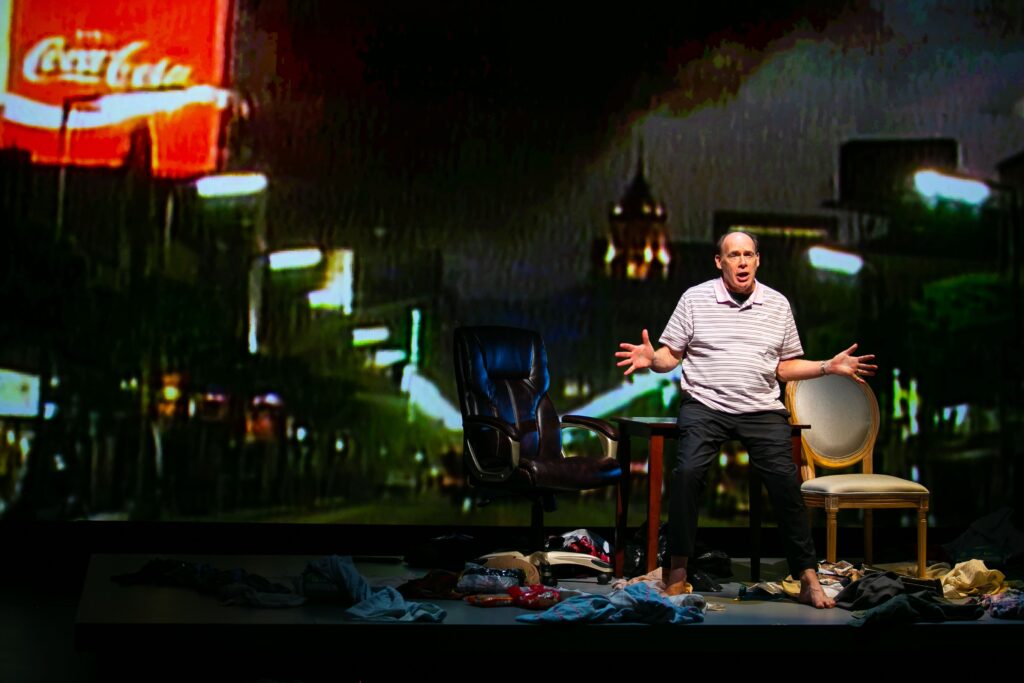
Smith assembles the first-person accounts to weave a layered work that not only gives a factual account of what happened during the course of the riots and its ripple effects, but context from eyewitnesses, community activists, and social critics. The timeline begins with Rodney King’s initial assault, the subsequent shooting of a teenage Black girl (Latasha Harlins) by an older Korean convenience store owner (Soon Ja Du) over a bottle of orange juice, and the events surrounding the beating of Reginald Denny, a white truck driver who was severely beaten by a group of Black men (who came to be known as the “L.A. Four”), his subsequent rescue by a diverse group of onlookers and the trial that followed.
There’s a lot to absorb in this two-and-a-half hour (including intermission) play, but David Bengali’s excellent projection design work fills in the gaps with dramatic video segments from key moments, such as the King and Denny beatings and riot footage that are necessary but sometimes difficult to watch. (It may also be helpful to read the “study guide” provided to ticketholders before the performance.) Twilight is at its dramatic best when the actual participants and the community activists (including Congresswoman Waters) tell their stories, and somewhat less so when the academics and social philosophers weigh in. The second act opens with “Chekhov/Coltrane,” an essay by the inspirational social democrat Cornel West, which is delivered by the entire company in segments where they finish each other’s sentences (a narrative device that is steadily creeping into many new social justice-themed works). While the prose is nice, it doesn’t really work well in the context of the production. Similarly, there’s a “Dinner Party that Never Happened” segment featuring various characters from the production, inexplicably hosted by celebrity chef Alice Waters, that just drags. One great addition to the revision, however, is the inclusion of Héctor Tobar, the former Los Angeles Times journalist who covered the riots and also draws parallels to the George Floyd murder.
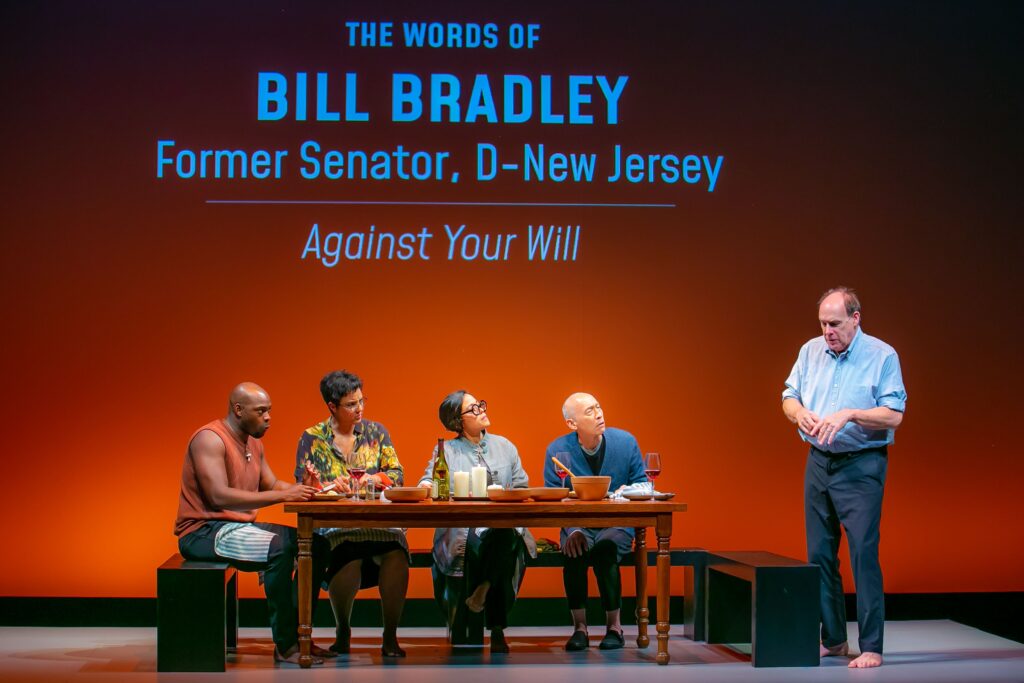
The stories by the regular folk delve deep and provide insight into the level of divide between the various groups – white (especially the police) and Black/brown, Black and Korean – by providing an unfiltered look at how these communities view each other, the us vs. them mentality that throws up roadblocks to understanding. But there’s also a real human side to much of the storytelling, such as the monologue by officer Theodore Briseno, one of four Los Angeles police officers involved in the Rodney King beating, who goes from being a hero in his sons’ eyes to a criminal, and the monologue by Elvira Evers, a pregnant Panamanian woman who was shot, taken to an ER and delivered a healthy baby – who absorbed the bullet in her elbow, and in the process, saved both lives.
The production is elevated by a first-rate cast, especially Tiffany Rachelle Stewart, who brilliantly sells her varied characters, including Elvira Evers, Maxine Waters, a clueless sorority girl, and Juror #7; as well as Francis Jue, who effortlessly transforms from the female character of liquor store owner Jay Woong Yahng to author/academic Elaine Kim and back again, and also paints a touching portrait of T-Reverend Tom Choi, who tries to bring healing to the post-carnage neighborhood.
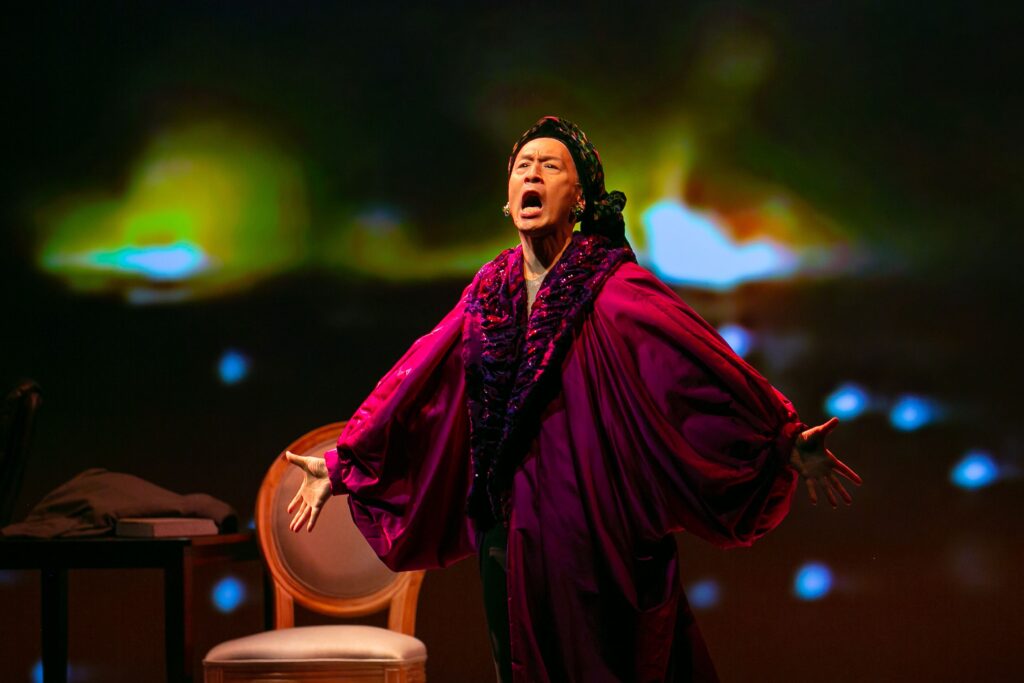
This is a terrific – although painful at times to watch – production, which is made more poignant by the unfortunate fact that, despite the convictions of George Floyd’s murderers, little has changed in human nature or the justice system. See this show. For tickets and information, go to: www.AmericanRepertoryTheater.org

